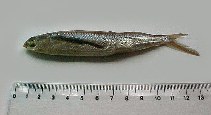| Family: |
Hemiramphidae (Halfbeaks) |
| Max. size: |
18.5 cm SL (male/unsexed) |
| Environment: |
pelagic-oceanic; marine; depth range 0 - 1 m, oceanodromous |
| Distribution: |
Indo-Pacific: East Africa to Tonga, north to southern Japan (Ref. 33390). Eastern Pacific: Mexico to Peru (Ref. 9306). Replaced in the Atlantic by Oxyporhamphus similis. |
| Diagnosis: |
Dorsal spines (total): 0-0; Dorsal soft rays (total): 13-15; Anal spines: 0-0; Anal soft rays: 13-16; Vertebrae: 47-50. Adults with a single large chamber to the swim bladder. Average number of gill rakers on the first arch, 30.7; predorsal scales, 31.1 on the average. Branchiostegal rays: 11-14 (Ref. 36576). |
| Biology: |
A true oceanic species, not bound to coastal waters at any period of its life (Ref. 9843).This species is the only halfbeak which doesn't have an extended lower jaw at the adult phase (Ref. 9306). Oviparous, with planktonic eggs and larvae (Ref. 36576). |
| IUCN Red List Status: |
Not Evaluated (N.E.) Ref. (130435)
|
| Threat to humans: |
harmless |
Source and more info: www.fishbase.org. For personal, classroom, and other internal use only. Not for publication.

